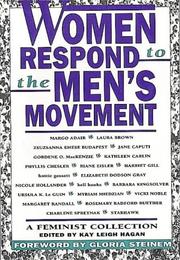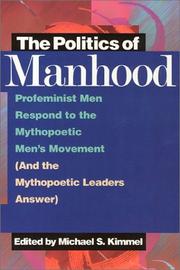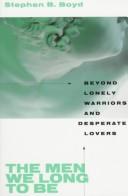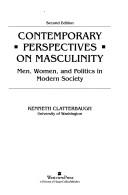| Listing 1 - 10 of 46 | << page >> |
Sort by
|

ISBN: 0062509969 Year: 1992 Publisher: San Francisco (Calif.) : Pandora,
Abstract | Keywords | Export | Availability | Bookmark
 Loading...
Loading...Choose an application
- Reference Manager
- EndNote
- RefWorks (Direct export to RefWorks)
Book
ISBN: 9782130816614 2130816614 Year: 2019 Publisher: Paris : Presses Universitaires de France,
Abstract | Keywords | Export | Availability | Bookmark
 Loading...
Loading...Choose an application
- Reference Manager
- EndNote
- RefWorks (Direct export to RefWorks)
Aussi ancienne que les luttes féministes, l'opposition à l'émancipation des femmes est loin de n'être que le reliquat d'un passé révolu : l'anti-féminisme contemporain reste vivace et pluriel. "Printemps des pères", "Manif pour tous", "célibataires involontaires" et mobilisations contre la "théorie du genre" : il est renouvelé par des masques séducteurs, des emprunts au discours égalitaire, par un répertoire d'action actualisé et par une nouvelle militante, dite masculiniste, dans un climat politique et social propice à son extension. Pour être compris et combattus, les antiféminismes doivent aujourd'hui être situés dans une perspective historique. Leur ancrage conservateur est souligné, mais aucune famille politique — ni aucune religion — n'est immunisée. Ils ne sont pas, non plus, le monopole des hommes. En analysant diverses expressions de l'antiféminisme depuis le XIXe siècle, les contributions à cet ouvrage démontrent la vitalité historique de ce combat et mettent en évidence ses points de contact avec l'homo-phobie et le racisme : l'intersectionnalité des haines. L'ensemble constitue une réponse inédite en même temps qu'un appel à la vigilance.
Anti-feminism --- Men's movement --- History

ISBN: 1566393655 1566393663 Year: 1995 Publisher: Philadelphia : Temple University Press,
Abstract | Keywords | Export | Availability | Bookmark
 Loading...
Loading...Choose an application
- Reference Manager
- EndNote
- RefWorks (Direct export to RefWorks)
Feminism --- Men --- Men's movement --- Psychology.
Periodical
Abstract | Keywords | Export | Availability | Bookmark
 Loading...
Loading...Choose an application
- Reference Manager
- EndNote
- RefWorks (Direct export to RefWorks)

ISBN: 0829812016 Year: 1997 Publisher: Cleveland Pilgrim Press
Abstract | Keywords | Export | Availability | Bookmark
 Loading...
Loading...Choose an application
- Reference Manager
- EndNote
- RefWorks (Direct export to RefWorks)
Many men experience guilt about their role in the mistreatment of others, resentment about being overburdened, and profound alienation from themselves and their world. In this much-needed book, Stephen Boyd exposes the detrimental impact of society's patriarchal demands and definition of men. He argues that many men become alternately "lonely warriors" and "desperate lovers" who have difficulty with relationships. He then offers an alternative identity for men and challenges them to transform their ways of being. Presenting a new view of manhood rooted in a renewed spirituality that recovers the best of Christian teaching, it provides men with an expansive way of being father, husband, lover, brother, and son. (Pilgrim Press)
Book
ISBN: 1009216899 1009216864 9781009216890 9781009216869 Year: 2023 Publisher: Cambridge : Cambridge University Press,
Abstract | Keywords | Export | Availability | Bookmark
 Loading...
Loading...Choose an application
- Reference Manager
- EndNote
- RefWorks (Direct export to RefWorks)
This Element shows how two social movements, lesbian separatism and Men Going Their Own Way (MGTOW), reflect the changing and complex (anti-)feminist ideologies of their time. The authors outline the historical and political background of those discourses and how they are influencing contemporary gender relations. The materials analysed comprise ten manifestos, which are examined with a combination of data-led discourse analysis and theory-led argumentation analysis. The manifestos are similar in that both sets of authors construct homogenous in-groups and out-groups as well as dichotomies between them. There are some differences though in how this is linguistically realised and who is classified as an out-group. Both groups cast social actors in particular roles and establish ethical norms, but strategic planning and utopias are more prominent among lesbian separatists. Freedom, advantage and authority are central in each group's argumentation, but lesbian separatists also stress humanitarianism while MGTOW focus on financial matters.
Sex role --- Lesbian separatism. --- Men's movement. --- Misogyny. --- Terminology.
Book
ISBN: 9782702187586 2702187587 Year: 2023 Publisher: Paris: Calmann Lévy,
Abstract | Keywords | Export | Availability | Bookmark
 Loading...
Loading...Choose an application
- Reference Manager
- EndNote
- RefWorks (Direct export to RefWorks)
Le féminisme est devenu incontournable : management, publicité, orientation scolaire, langage et écriture, visibilité des réalisatrices et des autrices, parité en politique, temps médiatique consacré aux sportives, violences sexistes et sexuelles… Les femmes n’acceptent plus d’êtremaltraitées et le clament haut et fort. Si le féminisme occasionne des résistances, si la gifle anti-#MeToo est si dure, c’est parce qu’il apparaît pour ce qu’il est : un projet global de transformation des sociétés, de renversement des conservatismes, de dénonciation d’un continuum de violences et d’injustices.« Calmez-vous, madame, ça va bien se passer », telle est l’injonction de ceux qui ont intérêt au maintien de l’ordre établi. Les antiféministes refusent de partager l’espace et le pouvoir avec les femmes. Invités sur les plateaux télé pour vendre leurs pamphlets, ils nous expliquent qu’il ne faut pas nous plaindre : « il y a toujours pire ailleurs »…La revanche patriarcale peut aussi prendre son temps, comme la Cour suprême des États-Unis l’a montré au monde entier en mettant un terme au droit constitutionnel à l’avortement. En attaquant les libertés et les droits des femmes, c’est la démocratie tout entière que l’on fragilise. À travers de nombreux exemples puisés dans l’actualité, cet ouvrage dresse un panorama salutaire des réceptions, positives et négatives, du féminisme aujourd’hui.
Feminism --- Feminism --- Anti-feminism --- Misogyny --- Men's movement

ISBN: 0813327008 0813327016 Year: 1997 Publisher: Boulder (Colo.) : Westview Press,
Abstract | Keywords | Export | Availability | Bookmark
 Loading...
Loading...Choose an application
- Reference Manager
- EndNote
- RefWorks (Direct export to RefWorks)
Masculinity. --- Men --- Men's movement --- Sex role --- Attitudes.
Book
ISBN: 0429974965 0429495331 0429963882 Year: 2018 Publisher: Boca Raton, FL : Routledge,
Abstract | Keywords | Export | Availability | Bookmark
 Loading...
Loading...Choose an application
- Reference Manager
- EndNote
- RefWorks (Direct export to RefWorks)
What is social reality for men in modern society? What maintains or explains this social reality? What condition might we imagine that would be better for men? How might we achieve this better condition? These are the questions Kenneth Clatterbaugh brings to seven different visions of men in modern society considered in this newly updated edition. In clear and insightful language, Clatterbaugh surveys not just conservative, liberal, and radical views of masculinity, but also the alternatives offered by the men's rights movement, spiritual growth advocates, and black and gay rights activists. Each of these is explored both as a theoretical perspective and as a social movement, and each offers distinctive responses to the questions posed.The first edition of this book was the first to survey the range of responses to feminism that men have made as well as the first to put political theory at the center of men's awareness of their own masculinity. This new edition adds chapters on recent highly-publicized movements such at the Promise Keepers, Million Man March, and the evolution of gay men's rights. Clatterbaugh treats all views with fairness and timeliness as he develops and defends a vision of men and masculinity consistent with feminist ideals and a just society.
Men's movement --- Men --- Masculinity. --- Sex role --- Attitudes.
Multi
ISBN: 9781009216890 9781009216869 Year: 2023 Publisher: Cambridge Cambridge University Press
Abstract | Keywords | Export | Availability | Bookmark
 Loading...
Loading...Choose an application
- Reference Manager
- EndNote
- RefWorks (Direct export to RefWorks)
This Element shows how two social movements, lesbian separatism and Men Going Their Own Way (MGTOW), reflect the changing and complex (anti-)feminist ideologies of their time. The authors outline the historical and political background of those discourses and how they are influencing contemporary gender relations. The materials analysed comprise ten manifestos, which are examined with a combination of data-led discourse analysis and theory-led argumentation analysis. The manifestos are similar in that both sets of authors construct homogenous in-groups and out-groups as well as dichotomies between them. There are some differences though in how this is linguistically realised and who is classified as an out-group. Both groups cast social actors in particular roles and establish ethical norms, but strategic planning and utopias are more prominent among lesbian separatists. Freedom, advantage and authority are central in each group's argumentation, but lesbian separatists also stress humanitarianism while MGTOW focus on financial matters.
Sex role --- Lesbian separatism. --- Men's movement. --- Misogyny. --- Terminology.
| Listing 1 - 10 of 46 | << page >> |
Sort by
|

 Search
Search Feedback
Feedback About UniCat
About UniCat  Help
Help News
News